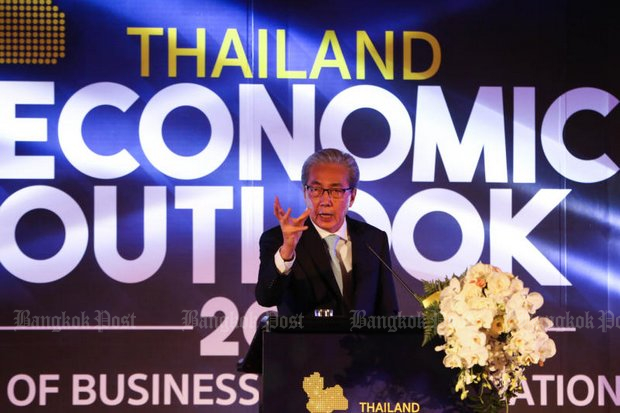
Thailand's economic growth is solid and economic policies are unlikely to be derailed by any cabinet reshuffles, says Deputy Prime Minister Somkid Jatusripitak.
The government's economic policies will remain focused on the goal of reforming both the society and the economy next year despite an imminent cabinet shake-up, said Mr Somkid Thursday.
"The cabinet reshuffle depends on the prime minister's decisions, but I propose Thailand should create a 'Thailand dream', a new political system that can attract talented people to work for the nation, not just elected politicians. Old politicians will resurface for general elections, which will not better the country," he said.
Mr Somkid said in three years of government administration, much progress has been made, such as with economic growth, which has risen from 0.8% in the first year, to 3.2% in the second year and an estimated 4% this year.
"This performance is not an accident. These are the concrete results of hard work by the government and Thais over the past three years," he said.
Mr Somkid said economic momentum is expected to continue next year thanks to the government's massive infrastructure investment, growing tourism, and export.
Thailand's international rankings have also improved, be it in the World Economic Forum's (WEF) global competitiveness report or the World Bank's ease of doing business rankings, while many infrastructure projects have been put into place after a decade of inaction.
The WEF report for 2017-18 released in September ranked Thailand 32nd out of 137 countries in competitiveness, up two notches thanks to improvements in infrastructure, macroeconomic environment, health and education development, market efficiency, financial market development and technological readiness.
Thailand was in the third spot among nine Asean countries after Singapore (third) and Malaysia (23rd). Indonesia ranked 36th, with Brunei at 46th, Vietnam 55th, the Philippines 56th, Cambodia 94th and Laos 98th.
The World Bank's latest "Doing Business 2018" report released early this month put Thailand in 26th place among 190 economies for ease of doing business, up from 48th place in 2017.
In ranking 26th, Thailand rose to the top 15% of countries globally for ease of doing business.
The government abolished a requirement to obtain a company seal and eliminated the need for approval of company work regulations from the Labour Department. As a result, the time taken to start a business was reduced to 4.5 days from 27.5.
The government also introduced an automatic risk-based system for selecting companies for a tax audit; reduced the property transfer tax rate; adopted legislation to broaden the scope of assets that can be used as collateral; and is using geographic information systems for access to electricity.
Systematic reforms continue to strengthen the business environment, focusing on areas with room for further improvements, such as enforcing contracts, registering property and paying taxes.
For example, the time required to enforce contracts is 420 days, compared with the maximum of 164 days in Singapore.
On registering property, the cost of transferring property is 7.3% of the property value, above the regional average of 4.3%.
Additional simplification in paying taxes -- in Thailand, it takes 262 hours on average to prepare, file and pay taxes, ranking 67th globally -- will also be important.
According to Mr Somkid, the planned infrastructure development will continue next year in order to facilitate transport and improve the country's logistics costs.
The government is also committed to kicking off infrastructure development to support the Eastern Economic Corridor next year.
"Chinese authority has already confirmed that about new 300 companies will invest in EEC next year," he said. "More companies from Japan, Singapore and Taiwan are also anticipated."